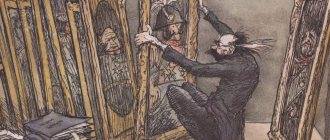Updated January 19, 2021
Hello, dear readers of the KtoNaNovenkogo.ru blog. The topic “Dream and Reality” was named in September 2021 as one of the top five areas for preparing for a graduation essay.
Students who receive a “fail” on the results of the December test have two more attempts to improve by doing a good job in February or May.
It is necessary to select arguments (what is this?) on the topic of the final essay “Dream and Reality”, stock up on quotes (what is this?), specify the topics, re-read half-forgotten works of fiction.
A clear algorithm of actions, which we will share with you in this article, will help you prepare
No. 1: Specification of topics in the direction of Dream and reality
Let us emphasize once again: “Dream and reality” is the direction from which you should start. The topics of the final essay are formulated more narrowly .
Take a piece of paper and write: “Dream and reality.” Themes. We formulated them like this:
- Is it good to be able to dream?
- What causes disappointment in reality?
- Does a dream help you achieve success in life?
- How do dreams that are not supported by action affect a person’s character?
- Is man a master or a slave of his desires?
- Why is the world of dreamers often contrasted with the world of practical people?
- Can a dreamer turn into an everyman?
Look in the dictionary to find a definition for your essay:
“A dream is a type of imagination that creates images of the future.”
In order not to overuse the word “dream”, use any synonym (“hope”, “expectation”, “dream”). Is it good? Now choose the topic you like and write.
O. Henry "Tinsel Shine"
American short story writer O. Henry had a remarkable talent for writing witty satire on reality. And he did this without malicious sarcasm, but with great love for people. His works are full of romance, his heroes are often dreamers who believe in miracles and go towards their dreams. The writer talks about real values, about the fact that every person should have a noble dream, in his short story “Tinsel Shine.”
The main character, Towers Chandler, is the most ordinary worker from a poor neighborhood. But in his dreams he is a successful slacker. To get at least a little closer to his dream, once every 70 days (that’s how much money he saved) he put on an expensive suit and walked through the center of Manhattan. He even hired a cab driver and dined at a good restaurant in order to pass for a rich man.
One day he meets a cute girl named Merion. She slipped on the sidewalk, and the hero helped her. Chandler invited a new acquaintance to a restaurant, and during the conversation he decided to make a good impression. But he chose the wrong approach, as it turned out later: he boasted that he did nothing but sail on a yacht and visit clubs. Surprisingly, the girl did not appreciate his story, expressing the opinion that every person should have a goal in life, and not sit back like him. The girl herself was dressed simply and gave the impression of a working person.
When Chandler arrived at his poor house, he rethought the conversation with his new acquaintance. He thought that perhaps she should not have lied about her wealth and idleness, but should have told the truth. Maybe then they would have a future together? The girl seemed decent and pleasant to him.
And after dinner with Chandler, Merion came to her expensive mansion. It turned out that she was very rich, but sometimes she put on a maid’s dress and went for walks like that. Her dream was to meet a decent working man who would love her not because of his wealth. The heroine is tired of people in her circle who simply waste their lives without a goal. Having met Chandler, she hoped that her dream would come true, but he turned out to be, according to him, also just a rich lazy person. If only he had told her the truth... And so, they both could not make their dream come true, although it was so close.
In this short story, one can easily guess the writer’s intention - to debunk the idle lifestyle of rich people, to point out that everyone should have a goal in life. And it doesn’t matter whether a person is poor or rich, he must work and bring benefit to the world. This was the dream of the main character, and therefore of O. Henry.
#2: A well-chosen quote is a third of your success.
Why exactly a third? Because it is easier to start from a quote when formulating the main thesis. She is a springboard for jumping. Everything else is a matter of technique and the result of being well-read.
Our topic will be revealed by quotes from the works of German and French romantics:
E. T. Hoffmann, L. Tick, V. Hugo, A. France. Among Russian writers, M. Prishvin and K. Paustovsky are suitable. Statements about dreams and reality contain works by V. Kaverin and A. Green.
Arguments on the theme “Dream” from the novel “OBLOMOV” by I.A. Goncharova
STOLTZ'S DREAMS
Example. Dreams come true: Stolz.
Having left his parents' house, Stolz achieves everything he dreamed of. He visited abroad, “sat humbly on the student benches in Bonn, Jena, Erlangen,” learned Europe “as if it were his own estate,” “saw Russia up and down.” He made a career, “served, retired, went about his own business and actually made a house and money.” Stolz is not engaged in creative activities, like his grandfather and father. He is "involved in some company that ships goods abroad." Stolz “is constantly on the move: if society needs to send an agent to Belgium or England, they send him; you need to write some project or adapt a new idea to business - they choose it.” Stolz manages to do everything: cope with a lot of things, go out into the world, and read - “when he has time, God knows.”
Example. Dream of love, ideal of the beloved: Stolz.
In Olga he saw the makings of his dream: “not only the luxury of blossoming beauty, but also strength, ready for life and thirsty for understanding and struggle with life.”
DREAMS OF OBLOMOV'S PARENTS
Example. Dreams of Oblomov's parents about the future of their child.
His parents understood only the obvious benefits of their son’s education, “they dreamed of a sewn uniform for him, they imagined him as a councilor in the chamber, and even his mother as a governor.” However, they wanted their son to achieve everything without difficulty, “somehow cheaper, with various tricks.”
OBLOMOV'S DREAMS
Example. Oblomov's dreams: a worthy position, quiet family happiness, peace.
After completing the course of study, Oblomov goes to St. Petersburg, dreaming of success in his career, a worthy position in society, and family happiness.
Dream and sleep are Oblomov’s usual forms of existence. In them he is happy, he lives truly: he feels “a vague desire for love, quiet happiness.” Oblomovka often appears in his imagination; he dreams of living among “the fields and hills of his homeland,” surrounded by his wife, children, friends, where there will be “eternal summer, eternal fun, sweet food and sweet laziness...” In his dreams, Oblomov draws two women. The first is the wife. The second is “a red-cheeked servant, with bare, round and soft elbows and a tanned neck.”
Example. Oblomov's dream of a life of peace
He dreams of leaving for the village not alone - with his wife, he rebels against the bustle of society (“I don’t like this St. Petersburg life of yours!”). And when Stoltz asks what exactly he doesn’t like, Oblomov answers passionately: “Everything, the eternal running around, the eternal game of crappy passions, especially greed, interrupting each other’s paths, gossip, gossip, clicking on each other, this is looking from head to toe ... Boredom, boredom, boredom... Where is the person here? Where is his integrity? Where did he disappear, how did he exchange for all sorts of little things?” The ideal of his life repeats in an aristocratic, sublime version the life of his grandfathers and fathers in Oblomovka.
Example. Oblomov’s youthful dreams were to see the world.
Oblomov sincerely loves Stolz alone, believes “him alone, perhaps because he grew up, studied and lived with him.” They are connected by romantic youthful dreams. With Stolz they were going to “travel the length and breadth of Europe, walk through Switzerland, burn their feet on Vesuvius, go down to Herculaneus.” They promised each other “not to die without seeing” the great works of the great Italians: Raphael, Michelangelo, Titian...
Example. Oblomov's dream of love and peace: Olga Ilyinskaya and Agafia Pshenitsyna
The vital forces, awakened for some time while trying to fulfill the youthful dream of travel, rushed to fulfill another dream - the dream of love.
In his dreams, the ideal woman seems to be the embodiment of “a whole life, filled with bliss and solemn peace, like peace itself.” He dreamed of finding in his beloved “an unchanging face of peace, an eternal and even flow of feeling.” In Oblomov’s dreams, a conviction was formed: passion is good in poetry and on stage, it will pass, and what will remain is “smoke, stench.” Therefore, after an ardent confession to Olga, he immediately gets scared: “Oh, what have I done! I ruined everything!.. Love, tears—does this suit me?”
Oblomov, who is in love, subtly senses Olga’s condition. “She loves me, she has feelings for me. Is it possible to? She dreams of me...” And when hopes arose for Olga’s reciprocity, pride began to play in him, “life began to shine, its magical distance, all the colors and rays that had not existed until recently.” Love filled Oblomov's life with meaning. He dreams of traveling abroad with Olga, intends to go with her to his green paradise - Oblomovka. Together they studied at the “pretty difficult school of life,” the school of love. Their sympathy grew, developed and manifested itself according to immutable laws: expectations and suffering, meetings and recognition. When the moment of “symbolic hints, significant smiles, lilac branches” had irrevocably passed, love became “stricter, more demanding, began to turn into some kind of obligation; mutual rights appeared."
The coincidence of the ranks of the hostess's husband and Oblomov himself becomes a hint of the inevitability of finding a dream in this woman's house. Here Oblomov immediately settles down like a lord. Like on Gorokhovaya, it occupies the entire front enfilade of four rooms. The windows of the office and bedroom overlook the courtyard, the living room overlooks the garden, and the halls overlook a large vegetable garden in which cabbage and potatoes grow. The furnishings in the rooms are unpretentious: “simple, walnut chairs” that were pressed against the walls; “under the mirror there was a card table; the windows were crowded with pots of eranya and marigolds, and four cages with siskins and canaries hung.”
Life in Pshenitsyna’s house was reminiscent of life in Oblomovka: peace and quiet, the hostess’s constant worries about the kitchen, where she reigned
DREAMS OF OLGA ILINSKAYA
Example. Dreams of happiness, of love for life (Oblomov and Stolz)
With Oblomov, Olga takes on the role of a “guiding star” and dreams that she will shed light “over a stagnant lake and be reflected in it.” Declaring her love to Oblomov, Olga admits: love for her is life, and life is “a duty, an obligation, therefore, love is also a duty: it’s as if God sent it to me and told me to love.” And Olga hopes that she “will have enough strength to live and love her whole life.” In her intention to “shed light over the stagnant lake,” she is persistent and persistent.
In her relationship with Stolz, Olga began to dream of happiness “in the wide arena of an enthusiastic life, with all its depth, with all its delights and sorrows.” Her love for Stolz is a mature, deep feeling. When Stolz declares his love to Olga, she is worried and cannot remain calm and indifferent; looks “as if begging for mercy,” speaks now with fear and entreaty, now “with the dignity of suppressed resentment and at the same time deep sadness,” whispers barely audibly, unexpectedly objects, etc.
No. 3: Arguments for an essay on the topic of dreams
Most of the difficulties start here. Let's remember which of the heroes of Russian literature loved to dream .
The landowner Manilov from the first chapter of N.V. Gogol’s poem “Dead Souls” comes to mind The writer made the sugar idyll (what is this?) of his life look like a caricature: everywhere there are only sublime projects, but there is no real, sensible owner’s eye.
Oblomov knew well what an unrealized dream is . He could spend hours imagining projects for the future arrangement of the estate, lying on the sofa, but at the same time he was too lazy to get up and write a letter to the manager. Both characters successfully illustrate the theme of dreams not supported by action.
Speaking about how dreams and reality collide, one cannot help but include Dostoevsky’s . In the story "White Nights" there is a hero named Dreamer . His feeling for a stranger does not fit into the concept of a “love affair.”
A noble idealist, the hero helps a casual acquaintance find her lover, while another in his place would try to outshine his rival. The girl gets married, but the Dreamer is grateful to her for the joy of the feeling he experienced.
M. Gorky wrote with inspiration about the dream .
The famous “Song of the Falcon” and the story “ Danko ” paint heroic images of fighters for the happiness of mankind. Danko sacrifices his own heart, tearing it out of his chest so that it will illuminate the path for people.
At the Bottom argue about dreams and reality . Their desires have not yet died, but the opportunity to achieve something has been lost forever.
See more arguments here:
Not all stories end on such a high note. In Chekhov's story " Ionych ", the youthful dreams of Dmitry Startsev and Kotik are contrasted with the vulgarity of their real life in adulthood.
Love, like a bud that did not open in time, could have been the only salvation from this boring story, but it did not come true, which is why the life of the heroes remained gray and ordinary.
A.S. Pushkin "The Captain's Daughter"
The heroes of Pushkin’s novel “The Captain’s Daughter” are trying to achieve their dreams in different ways.
The first example is the main character Marya Mironova. This girl lost her parents due to political games. She finds the meaning of life in love for Pyotr Grinev. But in order to become his half, the girl had to go through many tests. At first, Shvabrin's denunciation to Grinev's father that Marya is pursuing mercantile goals prevents the lovers from reuniting. The gullible old man forbids them to marry. Then Alexey takes Marya captive to force her to marry him. Peter frees the heroine from captivity with the help of Pugachev. For this he is accused of conspiring with state criminal Pugachev. And now it’s the girl’s turn to help her lover: she goes to the empress herself and asks for help. Marya's sincerity impresses the empress, and she frees Grinev. This is how loyalty to a dream leads to its fulfillment. Marya and Peter find well-deserved happiness.
The second example is Alexey Shvabrin. This hero is trying to achieve his dream at any cost. He is capable of meanness for the sake of his desire to marry Marya. The hero first slanders the girl in front of Peter’s father, then takes her prisoner, hoping to force her to fall in love with him, which, of course, is very stupid. The hero acts as a traitor even during the capture of the fortress by the rebels. He easily betrays his homeland, because he is not such a noble officer as Peter. Grinev acts honestly even towards his opponent and forces him to fight, but Alexei gets out of the situation by deception. Shvabrin crosses moral prohibitions for the sake of his dream. However, his unscrupulousness does not help him realize his dream. Peter frees Marya, enlisting the support of Pugachev; Marya herself does not succumb to his tricks and does not agree to marry him, despite the difficult situation. In this conflict of interests, the noble heroes Marya and Peter win, and the unprincipled Alexey loses.
The author shows, using the example of Shvabrin, how not to go towards your dream. Meanness and betrayal can only give temporary results and cause trouble for others, but they will not help make your dream come true. Having lost their dignity, people move away from their dreams.
Pyotr Grinev and Marya Mironova are noble individuals worthy of making their dream come true - and so it turns out in this novel.
#4: Let's start writing your essay!
Having chosen a topic in the direction of “Dream and Reality”, having determined for yourself the main thesis around which the arguments will be built, and having described them in detail, you can begin to write the text of the essay.
Do not forget that the composition must be three-part:
- Introduction.
- Main part.
- Conclusion.
As an example, let’s take the eighth topic: “ Can a dreamer turn into an everyman .”
Dream... Is there another word that is associated with so many exciting, exciting images? “...only those whose hearts are devoted to a sublime dream are alive...” These words of the great French writer Victor Hugo are dedicated to those who believe in the ideal, who are ready to go towards it through any obstacles, to fight, to endure hardships.
They are, as it were, opposed to the world of the bourgeoisie, the inhabitants, whose whole life comes down to sleeping and eating. Is it possible to imagine that a dreamer is capable of turning into someone like that? Let's look for the answer in the literature.
I think one cannot but agree with V. Hugo’s saying. Only brave and noble fighters for truth can be considered truly alive. True, the cruel world of reality does not always accept them kindly. Is it easy for them to live among us, facing everyday circumstances at every step: misunderstanding, ridicule, envy?
An example of a person whose desires are not destined to come true is the hero of A. P. Chekhov’s play “The Seagull,” Konstantin Treplev, a promising young playwright. He puts on a home performance, which fails miserably, since his modernist quests seem ridiculous to the audience.
Treplev’s personal life is not going well. His mother is passionate about the fashionable and successful writer Trigorin, as is his beloved Nina, whose heart still belongs to her rival.
Triple jealousy of the realist Trigorin, who seems to Treplev to be devoid of high poetic fire, results in a personal crisis. The young man commits suicide. Treplev did not become a commoner, but did not find the strength to live in a world full of dashed hopes.
In I. A. Goncharov’s novel “An Ordinary Story,” the antagonists (who is this?) are nephew Alexander and uncle Peter Aduev. The first represents the romantics, the second – the practitioners.
The daydreaming of the young provincial Sashenka, who arrived in the capital with a “mess in his head,” initially irritates the businesslike uncle. Then, watching his nephew acquire a secular gloss, Aduev Sr. is proud of him.
At the end, it becomes unclear which of the heroes has more feeling left: the skeptic uncle gets married and begins to write poetry, and the once flighty nephew turns into a colorless, indifferent person.
When faced with life's difficulties, dreamers rarely resist them. Their subtle mental organization does not allow them to become real fighters. This is why dreamers die sooner or later - physically or spiritually.
They get tired of being faithful to their high dream and turn into the most ordinary people. There are exceptions. For example, Don Quixote of La Mancha or Baron Munchausen, which many find funny. In general, answering the question posed in the title of the work, we have to admit that such transformations are possible.
A.N. Ostrovsky "Thunderstorm"
Dreams are different: some dream of wealth, others of love, and the main character of Ostrovsky’s play “The Thunderstorm” dreamed most of all of freedom. She saw real happiness in her. Indeed, in captivity, real or psychological, it is difficult to live without feeling like a bird in a cage.
The young woman Katerina grew up in a good family, where she could express her opinion. But after getting married, she moved to her husband’s house, and her mother-in-law managed everything there. Kabanikha, a wayward and despotic woman, poisoned the life of the young family with constant reproaches. Katerina was not used to this attitude, as she thought that all families lived in peace, like her parents.
Faced with an unpleasant reality, the heroine begins to feel an internal conflict: she does not want to argue with Kabanikha, but she also cannot come to terms with the infringement of her freedom. Tikhon does not protect his wife from his mother because he himself is afraid of her, despite the fact that he has long been an adult man. He tries to escape his problems, so he often visits the inn. But Katerina does not have such a right to walk around anywhere, and she has to endure the tyranny of Kabanikha every day.
The main character gets tired of such a life and finds solace in the love of another man, Boris. But this man does not live up to her hopes. The dream of love is destroyed again, causing Katerina to lose self-control and decide to take her own life. She can no longer live with Kabanikha and Tikhon, Boris does not accept her, she is tired of the outdated views of the inhabitants of their town. She dreams of freedom, but realizes that active struggle is beyond her strength, so she throws herself into the water.
Tikhon is inconsolable, because he really loved Katerina, he just couldn’t protect her. However, now the man became bolder and began to blame his mother for everything, although his fault was also not small. He should have thought about his own family earlier, protected his wife, and not cried after the tragedy that had already happened. It is unlikely that he has truly changed, because he never admitted his guilt, but blamed his mother for everything. Most likely, it was personal resentment that spoke up in him, and not resentment for Katerina.
Is it possible to blame the main character? It’s a pity for her, one can even understand her, but the writer shows us through her example how not to solve the problem.
Real life after marriage was not like her dream. The romantic girl was sensitive to the infringement of her rights, while her mother-in-law most likely considered this to be the norm in their society. Probably, Katerina should have at least tried to talk frankly with Kabanikha and put forward her conditions.
Arguments on the theme “Dream” from the play “THE CHERRY ORCHARD” by A.P. Chekhov
Example 1. Dream of a better life. (Lackey Yasha)
For Ranevskaya’s lackey Yasha, Firs is also a kind of “sign” of Russian life, which he dreams of parting with:
“Lyubov Andreevna! Let me ask you a request, be so kind! If you go to Paris again, then take me with you, do me a favor. It’s absolutely impossible for me to stay here. (Looking around, in a low voice.) What can I say, you see for yourself, the country is uneducated, the people are immoral, and, moreover, boredom, the food in the kitchen is ugly, and here is this Firs walking around, muttering various inappropriate words. Take me with you, be so kind!”
Example 2. A dream about a new life, a new way of life, order. (Lopakhin)
Lopakhin becomes the owner of the cherry orchard. In the monologue “I bought it!” he tells what happened at the auction:
"I bought! Wait, gentlemen, do me a favor, my head is clouded, I can’t speak... (Laughs.)
We came to the auction, Deriganov was already there. Leonid Andreich had only fifteen thousand, and Deriganov immediately gave thirty thousand on top of the debt. I see this is the case, I tackled him and gave him forty. He's forty-five. I'm fifty-five. That means he adds five at a time, I add ten at a time... Well, it’s over. I gave ninety over and above my debt, the rest is mine!”
The orchestra is being tuned, and the new owner is dreaming of a new life:
“Hey, musicians, play, I want to listen to you! Come and watch how Ermolai Lopakhin takes an ax to the cherry orchard and how the trees fall to the ground! We will set up dachas, and our grandchildren and great-grandchildren will see a new life here... Music, play!”; “Music, play clearly! Let everything be as I wish! (With irony.) A new landowner is coming, the owner of a cherry orchard! (I accidentally pushed the table and almost knocked over the candelabra.) I can pay for everything!”
N.V. Gogol, “Nevsky Prospekt”
- Not all dreams are equally useful for a person. Some of them are really worth fearing. For example, the artist from Gogol’s book “Nevsky Prospekt” saw a beautiful stranger on the main street of the city. He immediately fell in love and followed her in the hope of meeting her. The imagination of a creative person endowed the girl with some kind of magical charm. He followed her, and even seemed to see signs of attention from her side, but it turned out that the sweet young lady was leading him to a brothel. Seeing the hot spot, the hero was taken aback and ran away. At home, he desperately missed the young woman, or rather, his vision from Nevsky Prospekt. He endowed him with an extraterrestrial beauty with a hypnotic attraction. He immediately decided to save his ideal, to snatch it from the clutches of vice. But a repeated visit to the brothel showed that the desire was unrealistic. The girl laughed contemptuously in response to the artist’s sermons. All his illusions collapsed with a crash. He couldn't survive it. The conclusion can be drawn as follows: impressionable people should not pursue dubious ideals. They need to be afraid of their wild imagination.
- The collapse of hopes for a dream come true can hurt a person and deprive him of his incentive to live. For example, the hero of Gogol’s story “Nevsky Prospekt” is disappointed in his dream of saving a beautiful stranger. The young brunette he saw on the street turns out to be a worker from a brothel. Piskarev is very worried about this, but decides to rescue the girl from captivity of vice. Opium greatly inflamed his imagination, and in a state of drug intoxication, the man could no longer adequately perceive reality. Arriving at the brothel, he began to preach the rejection of an immoral lifestyle. Naturally, the heroine only laughed at the guest. She wasn't going to change anything. But Piskarev could not stand the collapse of his hopes and committed suicide. The unfortunate man simply could not live anymore, having lost his crazy dream, which is why the consequences of the destruction of dreams were so tragic.
Interesting? Save it on your wall!
Arguments on the theme “Dream” from the novel “DEATH” by A.A. Fadeeva
Example 1. Dreams of peace. (Frost)
He dreamed only of that promised land where he could lay his head.
This promised land seemed to Morozka in the form of a large, sun-drenched, peaceful village, full of chewing cows and good people, smelling of cattle and hay. He anticipated in advance how he would tie up his horse, drink milk with a piece of fragrant rye bread, then climb into the hayloft and fall soundly asleep under a warm overcoat. Suddenly, the yellow bands of Cossack caps grew in front of Morozka, Judas backed away, slamming him into the viburnum bushes, which fluttered bloodily before his eyes. The joyful vision of a large sun-drenched village in Morozka’s mind merged with an instantaneous feeling of the unheard-of vile betrayal that had just been committed here. “He ran away, you bastard...” said Morozka, suddenly imagining with extraordinary clarity Mechik’s disgusting, clean eyes and experiencing a feeling of aching, melancholy pity for himself and the people who were riding behind him.
Morozka was sorry not that he would die now, but that he would never see the sun-drenched village and these close, dear people who trusted him, who were riding behind him. He “felt them so vividly within himself, these tired, unsuspecting people,” that the thought of any possibility for himself did not arise in him, except for the possibility of warning them about the danger. He pulled out a revolver, raised it high above his head so that he could hear it more clearly, and fired three times, as agreed. At the same instant, something flashed loudly and gasped.
The world seemed to split in two, Morozka and his horse fell into the bushes, throwing his head back...
F. M. Dostoevsky, “Crime and Punishment”
- F. M. Dostoevsky in his work “Crime and Punishment” described a very dangerous dreamer who should beware of his desires. Rodion Raskolnikov sought to restore trampled social justice and distribute the surplus of rich people to the poor. To do this, he chose the first victim - the moneylender Alena Ivanovna. This old woman shrouded dozens of honest but poor families in debt networks. The hero kills her, and at the same time takes the life of her pregnant sister, who witnessed the massacre. But the fulfillment of his dream turns into the collapse of all his bright hopes. The stolen money did not help anyone, but only destroyed the peace of mind of the murderer and thief. Thus, some desires really should be feared, since in reality they can only be embodied in ugliness and sinfulness.
- Reality is sometimes unable to desecrate a dream, as the author of the book “Crime and Punishment”, F. M. Dostoevsky, proves to us. Sonya Marmeladova dreamed of converting Rodion to the Christian faith and directing him on the righteous path of atonement for sin. Therefore, the girl undertakes a moral feat: she goes to hard labor after her beloved. The harsh realities of prison life did not break the sublime soul. The heroine adapted to the cruel order and supported many prisoners with her care. Everyone loved her. Even the cold heart of proud Rodion melted. As a result, Sonya's wish came true: her chosen one renounced the inhuman theories. In the epilogue we see how he enthusiastically reads the Bible, imbued with wisdom and mercy. Thus, even the most seemingly unrealizable dream can break into reality and not be defiled by it if a person passionately believes in what he is doing.
A. Green, “Scarlet Sails”
- In Green’s work “Scarlet Sails,” the heroine proved by her example that even the wildest dreams come true if a person believes in them with all his heart. Once upon a time, a little girl received a prediction that a prince would come for her on a magic ship with scarlet sails. Assol believed in destiny and began to wait for that mysterious stranger, although everyone around laughed at her naivety. Society took out its negative attitude towards her father on her, and the girl grew up as an outcast. In addition, she was considered crazy, because who in their right mind would believe in stories about fairy-tale ships and handsome princes? But the heroine stubbornly believed in her lucky star, and for good reason. The brave sailor learned about her dream and fulfilled it, deciding to support the beauty. As a result, Assol waited for her wish to come true, despite the fact that no one believed in her. Thus, in order to realize your dreams, you must be a courageous and independent person, devoted to your ideal.
- To fulfill his dream, a person sometimes has to sacrifice a lot. For example, Arthur Gray from the story “Scarlet Sails” was forced to leave his home and sever ties with his family in order to become a sailor. His parents were famous aristocrats, representatives of an ancient dynasty. Their only son was destined for the fate of a diplomat, because his father was an important government official. However, the boy wanted to live differently. The gloomy and pompous atmosphere of the mansion depressed him. He wanted freedom and variety of travel. But the family did not approve of his intentions. Then the 15-year-old boy ran away from home. It was undoubtedly difficult for him to take this step, but he was able to step out of his comfort zone. This is the price of fulfilling dreams.
Arguments on the theme “Dream” from the story “GARNET BRACELET” by A.I. Kuprina
Example 1. Regret about a lost, lost dream (Vera Sheina)
A visit to the deceased Zheltkov and the hostess’s story about him are needed, first of all, by Vera Nikolaevna herself. She stays calm, talks, “choosing every word for the word.” However, self-control soon leaves her, and when the hostess mentioned the name of Beethoven, Vera Nikolaevna “suddenly began to cry.” Saying goodbye to Zheltkov, the princess placed a red rose under his neck, “tightly squeezed his temples with her hands and kissed his cold, damp forehead with a long, friendly kiss.” She understands that “the love that every woman dreams of has passed her by.”
Arguments on the theme “Dream” from the novel “PETER THE FIRST” by A. Tolstoy
Example 1. Youthful dreams (Peter the Great)
Peter's youthful dreams (of owning a mill or a tannery) reveal his detachment from government affairs and governing the country. The naivety of the young king is also hidden in his dream of marrying Anna Mons. “Why not?” - he is surprised. Aleksashka opens his eyes to this marriage: “Then wait for the alarm.” “For me this (going to Moscow) is worse, I don’t know why,” he reveals to Aleksashka. On top of that, there is always fear in his heart. “They will kill me, I know,” he says to his orderly.
To fulfill his dream, Peter, as always, does not spare himself and others. Exhausted, he sleeps in the boat, “wrapping his head in a caftan, snoring sweetly.” “His bare, skinny legs in his boots stuck out from his wide Dutch trousers.” Once or twice he “rubbed them, fighting off flies in his sleep.” Lev Kirillich Naryshkin, Peter's uncle, is dejected by this picture. “The kingdom is in the balance, and he’s tired of flies…” he thinks. Naryshkin can still hear the voices of the boyars in the Kremlin: “Peter has a direct road to the monastery. Kutilka, soldier's godfather..."
Example 2. The dream of family well-being (Ivan Brovkin)
Brovkin Ivan Artemyevich, Ivashka - a character in the novel by A.N. Tolstoy's "Peter the Great", serf of the landowner Vasily Volkov, a "strong" man. He has “a yard... prosperous - a horse, a cow, four chickens.” Brovkin’s hut is heated black, “the smoke goes out of the little window above the door.”
Brovkin is married, has a daughter Alexandra, and four sons: Gavrila, Artamon, Yakov, Alexei. The wife, Avdotya Evdokimovna, treats her husband with respect. Brovkin is a caring father who dreams of family prosperity.
Thanks to his natural ingenuity and intelligence, Brovkin quickly becomes rich (“People have forgotten when they called you Ivashka”). Volkovsky's steward now goes to visit him “at his new rich courtyard.” Brovkin dreams of successfully marrying off his daughter Alexandra.
Expanding his business, Brovkin dreams of settling in Moscow. He tells his daughter (having buried his wife, he often consults with her): “I want to build a stone yard in Moscow... We are entering the first hundred merchants...” Sanka is frank and harsh with her father: “It’s better to herd pigs with someone than to fade away from your stupidity.” . In anger, he throws a wooden salt shaker at Sanka.
Example 2. Dreams are plans. (Lefort)
Lefort is one of the few close associates of Peter who understands that the search for the rebellious archers is not over, “the teeth remain,” and the fight with Sophia continues. Possessing a large-scale state mind, Lefort is capable of dreaming. In his drunken palace, Lefort shares his plans and dreams with the Danish and Brandenburg envoys: “Mast forests rustle along our great rivers... With fish alone we can feed all Christian countries. We will sow flax and hemp even thousands of miles away. And the wild field is the southern steppes, where the horseman is hiding in the grass! Let's knock out the Tatars from there - we'll have cattle like the stars in the sky. Do we need iron? - ore underfoot. In the Urals there are mountains made of iron..."
Even terminally ill, he breathes “frequently, with a whistle, protruding his yellow collarbones, as if he was still trying to fit into life, like a collar... After confession, communion and the departure of the pastor, Lefort asks the majordomo: “Call the musicians... Friends... Bowls...” When a minuet began to play, and on his “deadly pale” face “his eyes burned tirelessly.” They bring a cup to Lefort, but he can no longer lift it.
Example 3. (Sanka Brovkina)
Sanka's dream comes true - to dance with the European king. She dances with the Polish King Augustus, dreams of conquering this seducer of women. She is introduced to the monarch by her favorite Atalia Desmont as the “Moscow Venus.” “August looked with pleasant surprise at the Moscow Venus - two ash-blond waves on his bowed head, a curly strand falling on his low open chest, a few flowers in his hair and on the dress - simple, without pick-ups on the sides, similar to a Greek tunic, across the shoulder is a cloak woven with gold, dragging along the carpet.”
As in a magical dream, Sanka sees Augustus bowed before her, “as if from distant lands, as if from a deck of cards - big, smart, amiable, with a red mouth, with high sable eyebrows” (“Here it is - the awaited hour”) . Sanka looks enchanted “into his confidently shining eyes: “She’s dead.”









